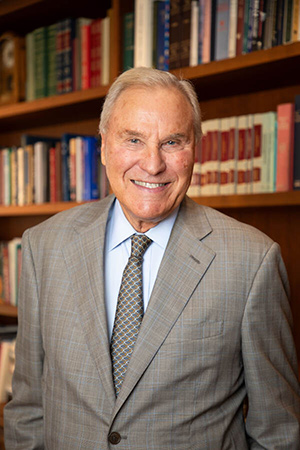
Gary P. Brinson, CFA
Founder and Chairman Emeritus
The Foundation provides a formal structure for the family to interact as members of the board of directors and to work cooperatively with each other in shaping the direction of our philanthropic interests.
Founder’s Statement
I was born in 1943 and raised in a small home just south of Seattle, Washington. My father was a bus driver and my mother a store clerk. My parents had meager financial income and little resources to cover the costs of raising three boys. I was an average student early in life but realized that I needed an advanced education if I was to break away and achieve my goals of financial independence. I was fortunate to be able to achieve success in the investment management world and eventually formed Brinson Partners where I applied my experience and training until my retirement in 2000.
The Brinson Foundation was created in 2001 as the residual result of my decisions regarding wealth transfer to my heirs. After addressing the interests of my family, including a limited generational line of heirs that follow, the remaining fraction of my wealth goes to the Foundation for philanthropic purposes.
In point of fact, I am placing limits on the size of wealth transfer to my heirs. My reasons for limiting the size of the wealth transfer for my heirs stem from my strong belief that “excessive” amounts of this form of largess diminish individual initiative and self esteem. If I had no opinion with respect to limiting the size of wealth transfer to my heirs, there would be no Foundation.
The Brinson Foundation has been funded to date with approximately $300 million, of which $100 million was gifted to the California Institute of Technology in 2023 to establish the Brinson Exploration Hub. The Foundation is likely to receive considerable future funding, the size of which will be a function of investment returns, targeted allocations for my heirs, and deductions for estate taxes and administrative expenses. The government’s estate tax policy will not impact the size of the wealth transfer to my heirs, but will impact the remaining residual for philanthropy. Higher estate tax rates will mean less for philanthropy; lower rates will mean more. If estate taxes become onerous, there will be no further funding for the Foundation at my expiration other than that already included in my estate plan.
My reasons for creating the Foundation as distinct from pursuing personal philanthropic activity are twofold:
- The Foundation provides a formal structure for the family to interact as members of the board of directors and to work cooperatively with each other in shaping the direction of our philanthropic interests.
- The Foundation can have more of a targeted and focused set of priorities that can evolve with the family’s growing knowledge and understanding of philanthropic initiatives. In this sense, my personal beliefs stand a better chance of surviving with the passing of time.
The assets of the Foundation must be considered a scarce resource with an investment objective of moderate risk that should satisfy the goal of earning a 4.0% to 4.5% real (inflation adjusted) return over time. This moderate risk objective is to be defined at the aggregate portfolio level and derived from a globally diversified asset mix across all investible asset classes. I am not concerned with the risk of individual securities or asset classes, but only with the aggregate risk of the entire portfolio, which is “optimal,” expressed in terms of return per unit of risk. With a payout requirement set by law at 5%, this investment goal suggests that there will likely be some diminishment in the real value of the assets for future years. Adopting a more aggressive risk profile is not appropriate, as I view the risk of shortfalls in returns to be more detrimental for grantees than any benefits from higher returns. I believe foundations should always keep this “utility function,” as economists call it, firmly in mind.
Some of my personal beliefs which guide the grantmaking activities of The Brinson Foundation are noted below:
- The embracement of philanthropy is different than that of charity. The Foundation should avoid “charitable grantmaking,” by which I mean grants that deal with symptoms rather than causes.
- The scope of the Foundation’s activities should be as narrow as possible given the diverse interests of its directors. My hope is that, over time, the Foundation will operate with a limited set of priorities and strive to make an impact and contribution within that self constrained focus. These priorities will likely change and evolve over time. Maintaining a discipline of a narrow set of focus areas will be a necessary challenge.
- I am a libertarian who values individual liberty and what Ayn Rand calls objectivism. I am convinced of the merits of Darwinism and deeply troubled by the general societal ignorance of this reality as it relates to the development of mankind. I am opposed to all forms of egalitarianism that try to diminish individual freedom in the name of some misplaced societal notion. Equal opportunity, which I support, does not mean equal results for all, which I oppose. The Foundation should stress the importance of individual accountability for action or inaction.
- Science, scientific research, and rational thinking should always receive the Foundation’s attention and grantmaking support.
- The fact that the Foundation is a U.S. based organization should not prevent it from defining its role in a global context if that can be accomplished without compromising our standards of practice.
- Sensible funding of “higher risk” programs where the likelihood of failure is evident is appropriate for a moderate portion of the grantmaking portfolio.
- I have worked closely with the other directors to ensure that my personal convictions are reflected in the Foundation’s grantmaking guidelines. These include my view that we should avoid funding religious and “faith based” programs; my preference for market-based solutions over government programs; my belief that medical research should focus on quality of life rather than the extension of life; and my opposition to racial, ethnic, and gender specific programs (excluding medical) as a result of my fervent belief that discrimination of any form is antithetical to mankind’s progress and further evolution.

Gary P. Brinson
Founder and Chairman Emeritus
